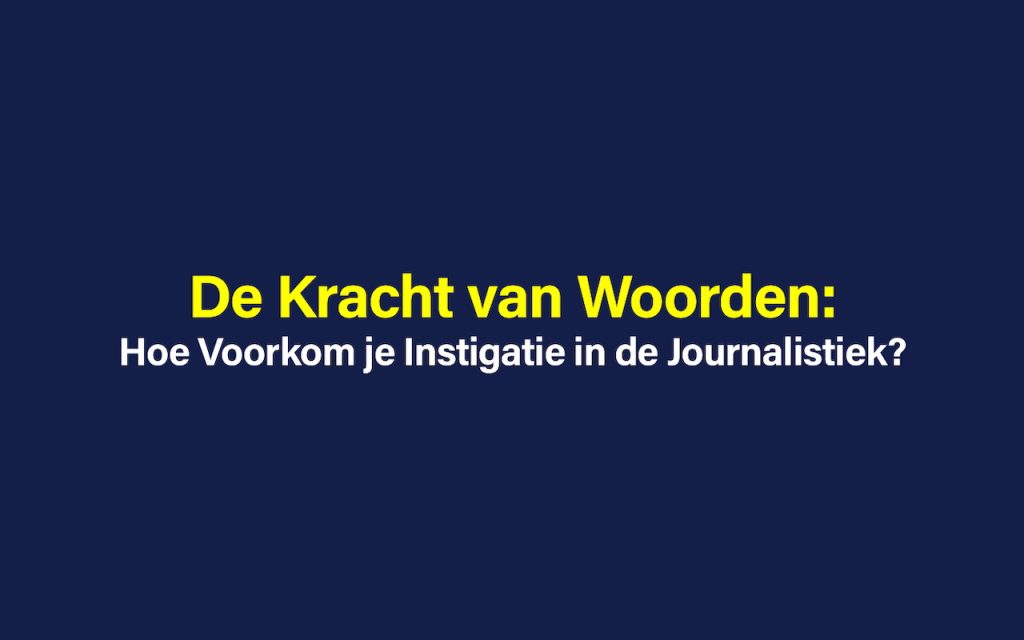
Responsible use of language and messaging
Words have power. In journalism, words can inform, inspire and connect, but they can also divide, polarize and even incite violence. Instigation - provoking hatred, division or hostility - is an ethical and social problem that every journalist must avoid.
The Dangers of Instigation
Instigation can arise when a journalist or media platform:
- Consciously or unconsciously pitting groups against each other.
- Stereotypes or prejudices reinforced.
- Calls for hostility or violence.
- Public emotions manipulated by sensational or one-sided reporting.
The consequences of instigation are serious: It can lead to polarization in society, reputational damage for those involved and a decline in trust in journalism.
Ethical Principles to Avoid Instigation
- Objectivity and Accuracy:
Identify all relevant facts and give all parties a chance to be heard (adversarial process). Sensational stories increase the risk of instigation. - Avoidance of Polarizing Language:
Do not use terms or phrases that pit groups against each other. Assess carefully whether the words chosen are neutral and factual. - Respect for Involved:
Protect the privacy of individuals and avoid accusatory or derogatory language. - Be Watchful of Stereotypes:
Highlighting ethnic, religious or cultural backgrounds is often irrelevant and can be stigmatizing. - Assess the Impact of Messaging:
Ask yourself whether your story could lead to unintended consequences, such as uproar or division. Responsible journalism carefully weighs the public interest against potential social harm.
Concrete Tips for Journalists
- Choose your words carefully: Avoid terms that are emotionally charged or may evoke aggression.
- Avoid generalizations: Base statements on facts and not assumptions or stereotypes.
- Focus on solutions: Instead of highlighting conflict, try telling stories that promote connection and understanding.
- Factcheck thoroughly: Disinformation can fuel tensions and misunderstandings. Make sure all facts are checked and correct.
- Revise headings and titles: Sensational headlines may attract attention, but they can trigger harmful emotions. Opt for neutral and informative titles.
Examples of Responsible Messaging
- Constructive Journalism:
Stories that contextualize conflict and explore possible solutions help promote understanding and empathy. - No Unnecessary Sensation:
Reporting incidents without excessive focus on negative emotions or hostile statements. - Inclusive Language:
Using language that respects diversity and equality, rather than polarizing rhetoric.
The Legal Frontier: Sedition
Under Dutch law, sedition (Article 131 of the Penal Code) is punishable. Intentionally inciting hatred, violence or hostility can lead to legal prosecution. Journalists should be aware of the responsibility their words carry, both ethically and legally.
How to Stay Within Ethical Boundaries.
- Reflect on your messaging: Ask yourself and colleagues whether your story is ethical and avoids the risk of instigation.
- Seek feedback: Have editors or ethics committees review sensitive stories in advance.
- Provide balance: Allow for different perspectives and minimize one-sidedness.
Using the Power of Words for Connection
Words have the power to divide, but also to connect. Journalism can be a powerful tool for creating understanding and empathy, as long as journalists adhere to ethical standards and use language carefully. By taking responsibility for the power of words, journalism can contribute to a society in which information is shared not only fairly, but also respectfully.
"Using language responsibly is not only an ethical duty, but also a service to society."

